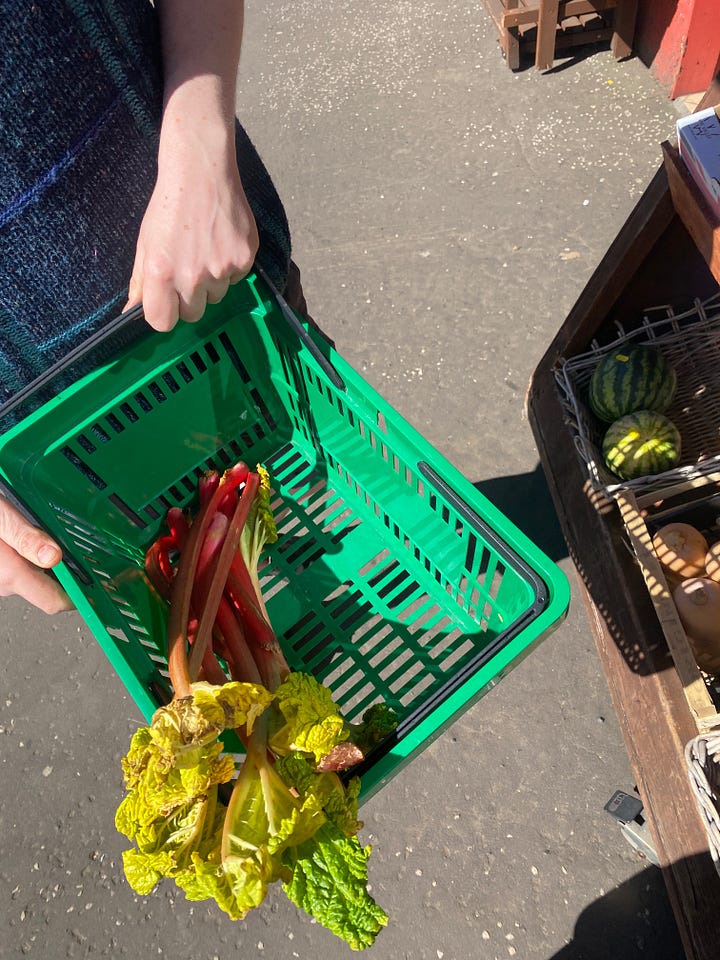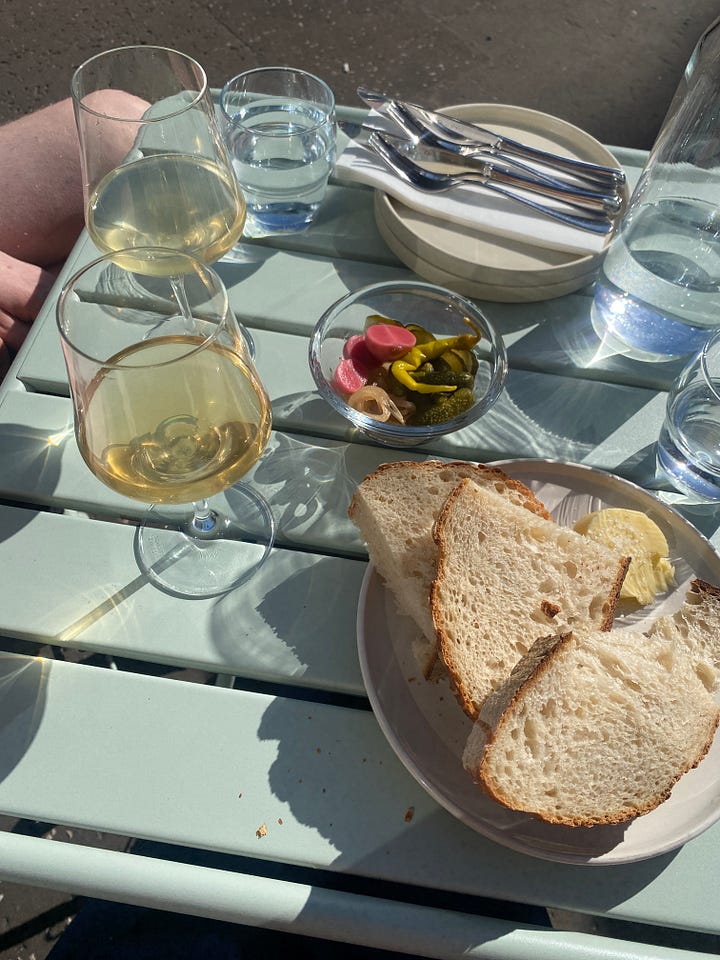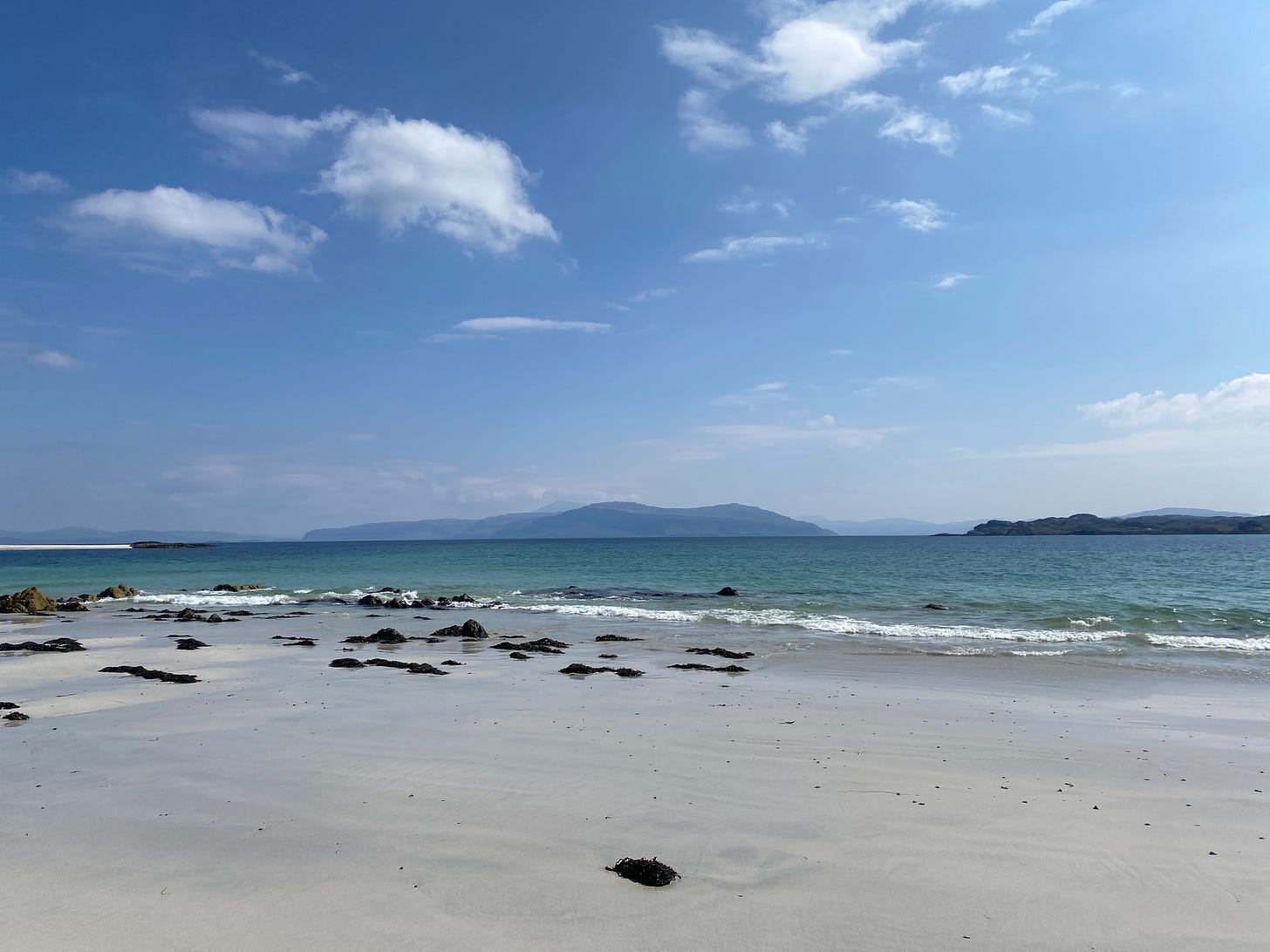I wrote this newsletter almost three weeks ago. Or, I started to. But between going on holiday, enjoying the delights of Mull and Iona, and a long weekend up north to celebrate my birthday, followed by a long weekend in my old neck of the woods, enjoying swims and boat excursions, and a week traveling for work, this newsletter has sat in drafts almost ever since it’s conception. So, I’ve updated it, and it sounds quite different than it did three weeks ago. It also includes many more words than I’d originally intended. But it’s exactly what I think it needs to be.
Scotland is experiencing weeks of sun. A rarity, usually. When I first wrote this, we were two weeks into the sun and the rain had just come – albeit briefly, for a day. I wrote the following: It’s been utter bliss. Waking up to the sun, finishing work to the sun. Drinks in the sun. Walks in the sun. Pastries in the sun. Every single moment worked around the sun. People working behind the counter in ice cream shops look exhausted. Local park bins are overflowing. Grassy areas now lie covered in picnic blankets with people keen to sunbathe, though the wind doesn’t quite oblige. The city transforms in the sunshine and so do I.
Insufferably happy was how I described myself those first two weeks of sun. So inspired by my next door neighbour's gardening, I found myself buying gardening gloves and asking my dad to build me planters. I also became wholly “unproductive” - work? God, why. Why should I work when the sun shines outside my window?
When I wrote the first draft of this newsletter, I was a couple of weeks from my birthday. And a couple of weeks into the sun – how things have changed, now 6 weeks into endless sun, too much sun really. The driest spring on record. Records I wish we didn’t continue to break year on year.
Originally, this newsletter was supposed to come out the day after my birthday. In the first draft, I wrote about how birthdays have a habit of making me feel anxious. I found myself feeling defeated, disappointed at what I hadn’t succeeded in by this age, or what I expected to succeed in over the last year. Quietly, I think many of us set these secret deadlines in life. I thought that by 25 I’d have achieved certain things, and as 26 approached I found myself worried that I’d not done enough. Heck, that I wasn’t even celebrating the right way – as if birthdays must be celebrated a certain way. As though spending time with a loved one isn’t enough, as though I needed a party to make sure I’d ticked a box (even though I didn’t want one this year).
I vividly remember a specific birthday as a child where I had an Ancient Egyptian-themed birthday, having been fascinated by the Ancient Egyptians while learning about them in primary school. It was my 11th birthday (I dug through old photos to find out). We all dressed Cleopatra-esque and my mother made a Pyramid-and-the-Nile cake. We played party games, made pizzas – and while all of my friends were downstairs in the living room playing, I went up to my bedroom and wrote a speech. I printed it off from the family computer (remember those - ‘computer rooms’?) and I stood on a chair and read it to my friends somewhere around birthday-cake-cutting time. I have no memory of what this speech said. I just know it was aptly dramatic and self-indulgent.
I suppose, as a birthday speech ‘should’ be.
This memory has been looping around my mind of late. It feels telling to me that even at that age, I felt the need to leave the party to memorialise it. That I’ve always had a deep need to put my thoughts into writing, to figure out what it is that I want to say by first writing it down. I’ve quoted it in this newsletter once (maybe twice) before and I’ll quote it again because it rings true for me just as it did for Joan Didion:
As I sat in the park for a half hour on my own, watching it fill up with post-work humans desperate to soak up the sun’s final rays, I saw three kids running, one on a small bicycle, and one who all of a sudden tripped and let out an agonising scream as her skin met the pavement and her blood met the gravel. Two women walking behind ran to catch up - not parents, unknown to these kids - and picked up the little girl, carrying her through the park at the guidance of the other kids who directed the woman to the girl’s adults. I watched it all unfold, watched the heroes, watched the little girl hobble proudly to her friends later. Thought to myself how beautiful humans are.
I am met every day by the horror of what humans continue to do to this planet, to one another. And everyday, I’m met back with the kindness of strangers, with the sweetness and care of my friends, with the beauty of nature all around me, with the dandelions that grow between the cracks in the wall and the pavement, with the small birds that dart between the leaves of the hedge outside my window, with the couple opposite who eat dinner every night together.
Hopelessness is an emotion I find all too easy to sink into. After the last T presidency, I was at an arts academy out in the USA, watched it unfold live, had friends who’d voted, knew how high the stakes were – in essence, I was there. I was right there in it when the Big Orange was elected. I feared it would happen just as Brexit (something once seemingly impossible) happened – watched people befall the lies of politicians in suits as we’ve befallen them time and time again, watched people fall down into holes where they could sit in the belief that my life is more valuable than another’s. Empathy has long engulfed me. I was the child that cried when a villain was injured in battle, I sobbed when others sobbed, I tear up when I hear the stories – happy, sad, conflicting stories. I look at the state of the world and find myself staring out as though at an abyss. And yet, I am reminded of the privilege it is to sit in hopelessness. And yet, I am reminded of those who’ve come before me. And yet, I am reminded of a quote I come back to and tell myself again and again and again:
–Toni Morrison
Stories. It comes back to this time and time again for me. I think if only people could listen to the stories of another – not just hear, but truly listen – how different our world would look. It’s why wiping out languages has been a tool of oppression, that when languages are lost, so are the stories. So is the heart.
The stories we tell ourselves create the narratives which shape our lives and beliefs. That time my grandfather dug up potatoes with me – or I with him – and the way it seeded a value for the land in me so quietly that I didn’t know of the oak tree that grew within me until years and years later. That’s a story. “Remember when your grandpa and you used to dig up potatoes?” My mother tells it to me, I tell it too to others. My cousins share similar stories, swap various versions of this Potato Digging Extravaganza. Or the runner beans we’d harvest or the peas we’d eat fresh from their pods. We sow stories of a man no longer here into one another, of the potatoes he grew that we’d dutifully take to my grandmother who’d turn them into gold. My sister and I would help her wash them, scrub the brown dirt off in a basin with a brush. She’d boil them and soak them in butter, set them in a tray kept warm in the Hostess Trolley next to the dining table. Then, later, when all the trays were harvested from the Hostess Trolley and laid out on the dining cloth, silver lids lifted off to reveal various vegetables (also from the garden) and usually slices of ham, we’d fish those golden tatties out of a their pool of butter and lick the plates clean.


What is a story? Does it have a beginning, middle, and end as we’re taught in school? Does it even have to have an “ending” to be considered a story? Must there be a Hero and a Villain? A main character? Must it have those five key elements; plot, setting, characters, point of view, and conflict? Or, is it just that. Something someone told you. The story of my grandfather and me digging up potatoes in the garden, of my granny turning them into balls of gold that swam for a moment in time in a pool of butter.
I think a story changes you. It can be as simple as what I’ve told you. But it changes something; something in you, something in someone, something in this world.
I remember in my writing studies, on day one of the programme, the Director asked us all to share what we wanted to achieve. Nervously, everyone tried to pick the “right” answers to impress fellow students or tutors. One person shared his joys at reading and words and creating worlds in his work and excitedly said, “Really, I want to change the world.” A few chuckles cracked through the room, but for more than one reason: for the nervous tension in the air being broken, for the warmth of his words, for the way he said it with such a big grin.
In our own way, all the time, we change worlds. And if I’m honest, I worry my life makes no difference at times. That in the face of such horrific crimes, my little stories make little difference. But then I remember my grandpa and my granny and the potatoes and the butter. And I think, if all it comes down to is that, then maybe this is all I can do now. Tell you of how potatoes and butter changed my world.
And maybe, just maybe, I’ll be changing worlds too.
POEMS: Poems for Palestine. Because we need art. We need poetry. We need action.
MOVIE: Scrapper. A must-see.
SHORT FICTION: Returns by Annie Ernaux.
It’s hard to know what to say at the moment. Which is why I say what I can. So thank you for joining me for another newsletter, another series of thoughts, of workings-out. Of stories.
Thank you, as always.











